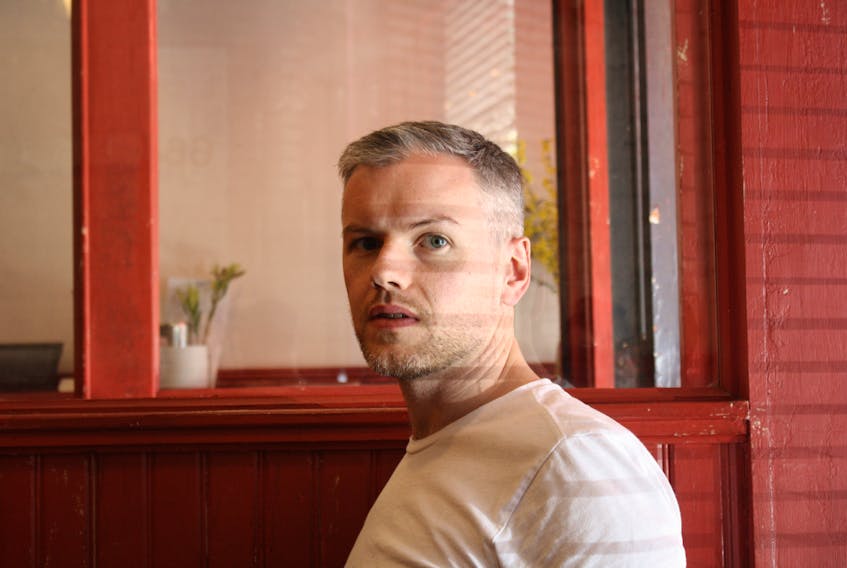Daily life might be more isolated in the midst of the global pandemic, but James Gregor continues to do what he always does: sit at his desk in Halifax and write. He’s at work on a second fiction book after his debut novel Going Dutch was released last year to rave reviews and even landed on a best of 2019 list.
Set in New York City, Going Dutch (Simon & Schuster) opens with Richard, a gay man in his late 20s who is a PhD student in medieval Italian literature at Columbia University, suffering from writer’s block. Apathetic about his studies and unable to write anything new, he is at risk of losing his private fellowship funding. If he doesn’t get the money, he will have to move back home to Maine and leave New York – something he really doesn’t want to do.
The problem is: living in New York is expensive. Richard, like many young New Yorkers, often finds himself in an awkward position when the bill arrives at the end of a meal. Who will pay? Should the bill be spilt even though someone ordered a drink and the most expensive item on the menu? The book’s title comes from the expression meaning each person pays for their own expenses instead of anyone paying for anyone else; Gregor uses Going Dutch to symbolize financial and other inequalities that exist between characters in the novel.
“It was sort of a metaphorical expression of this tension that exists for the vast majority of people in New York,” said Gregor.
Despite Richard’s lack of money, stability, or future lucrative job prospects, he spends his time and energy on online dating apps.
“The challenge of presenting oneself on-screen, widely considered a prerequisite for a full life in the early 21st century, flustered many, including Richard. ... Enough guys did, thankfully, find him cute, but not necessarily mysterious or hot,” Gregor writes.
Richard, the “misty introvert,” goes on a lackluster date early on in the book. He not only experiences tension when the bill comes at the end of the meal, but also finds himself pondering the complexities of life in New York and the loneliness of being single.
“For such a supposedly solitary city, where everyone either was a lonely neurotic who lived with a dog, or blew most of their paycheck on therapy, analysis, or rent, New York could at times feel as if it was the exclusive domain of couples. And children. Every day there were more children,” writes Gregor.
Gregor fell in love with the city while completing his Master of Fine Arts in writing at Columbia University. “I was kind of intoxicated by it [New York],” he said. “I was stimulated by the city and wanted to write about it.”
He finished his degree in 2011 and started writing his novel after that. It took him five years and several drafts before he completed the book and got it published by a big American publisher.
“It really has been a dream come true,” he said.

The spark for the novel began with Gregor’s own online dating experiences. Living in New York, along with millions of other people, he found himself in the odd situation of recognizing a person, in a store or on the street, who he had seen on a dating site.
“There was this odd phenomenon I hadn’t experienced before. I would often know so much about the person from their dating profile,” he said. “The anonymity of the city was broken down.”
Through Richard, Gregor explores this phenomenon in his novel. Tired of the online dating world, his lack of academic progress and his feelings of loneliness, Richard seeks the help of Anne, a brilliant and wealthy fellow doctoral student. They begin meeting regularly at the library, where Anne ends up doing most of his writing. Their work time is usually followed by an expensive meal at a trendy restaurant, with Anne footing the bill.
Richard and Anne gradually develop a deeper relationship that at first seems implausible. Richard dates men and Anne is a woman. But through Gregor’s layered portraits of the characters, their relationship becomes plausible.
“Fiction obeys its own laws and it can also reveal the infinite permutation that life can take,” said Gregor.
Richard eventually finds himself in what could be called a modern love triangle. After meeting up again with Blake, a successful lawyer he met on a dating app, they move in together. Blake is eager to create a stable, long-term relationship with him, but there is a problem: Richard is in a complicated relationship with Anne. Richard’s sense of doom increases, his world comes crashing down and he is forced to make a decision.
“I wasn’t sure how the book would end,” said Gregor, adding, “I tend to feel it out and know only a few steps ahead and hope I can make it to the end.”
For Gregor, the writing experience is best summed up by writer E.L. Doctorow, who said: “Writing is like driving at night in the fog. You can only see as far as your headlights, but you can make the whole trip that way.”
With his second novel now in progress, Gregor is hopeful the writing process will be a little easier this time around.
Other books on the shelf
Crow
Amy Spurway’s novel Crow is in the running for the Stephen Leacock Memorial Medal for Humour, which comes with a $15,000 prize. The winner will be announced on June 5.
Spurway, who was born in Cape Breton but now lives in Dartmouth, set her novel on the island. It follows Stacey Fortune, better known as Crow, as she returns home from Toronto after being diagnosed with brain tumours.
Watermark
Author Christy Ann Conlin’s book Watermark (Astoria, an imprint of House of Anansi Press) has been shortlisted for the Danuta Gleed Literary Award by the Writers’ Union of Canada. Each year, a $10,000 prize is awarded to a Canadian writer for the best first collection of published short fiction in English.

Don't Panic
Financial advisor Christine Ibbotson, also known as the syndicated Ask the Money Lady columnist, has released an eBook to help ease financial worries during the pandemic.
Don’t Panic: How to Manage your Finances—and Financial Anxieties—During and After Coronavirus (Nimbus Publishing) is a collection of thoughtful responses to readers concerns, and practical advice. When the pandemic hit North America, Ibbotson started receiving hundreds of emails from readers asking her: should I sell off my stocks? How can we use this situation to make money and lower debt?
River Heat
Dartmouth-based crime writer Graham MacDermott has released his second thriller, River Heat. The book opens with the discovery of a nude girl’s dead body next to a beaver lodge and follows former RCMP undercover cop, Kyle McKinley, who spends his summers at his cabin in northern New Brunswick and his winters on South Padre Island in south Texas. MacDermott first wrote about McKinley in his 2016 book Revenge River. His new book is available through Amazon, and Barnes & Noble.









